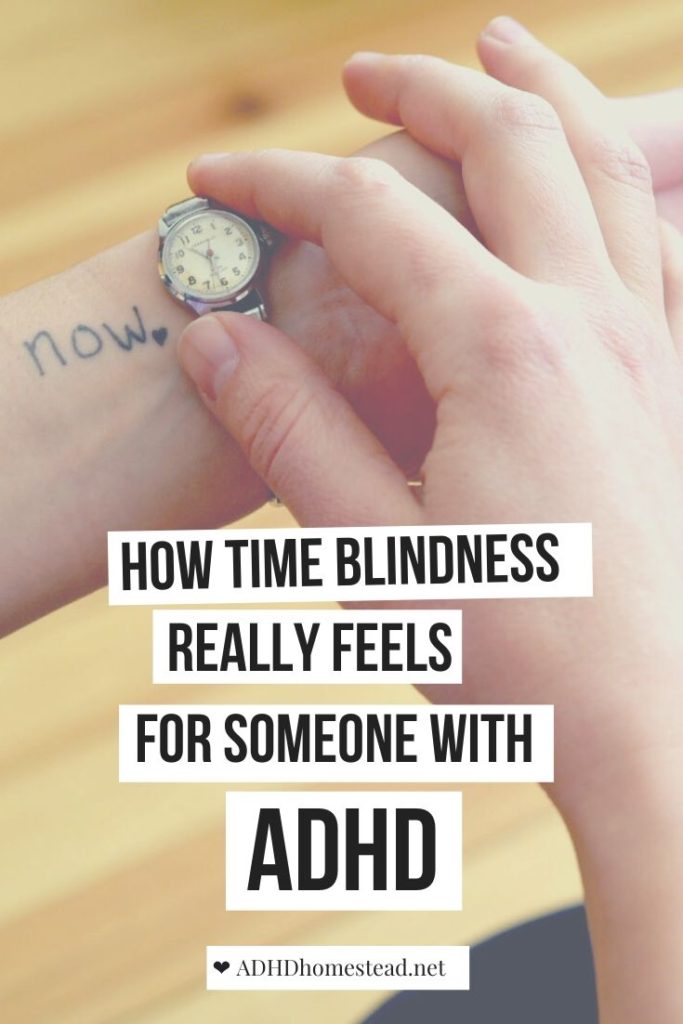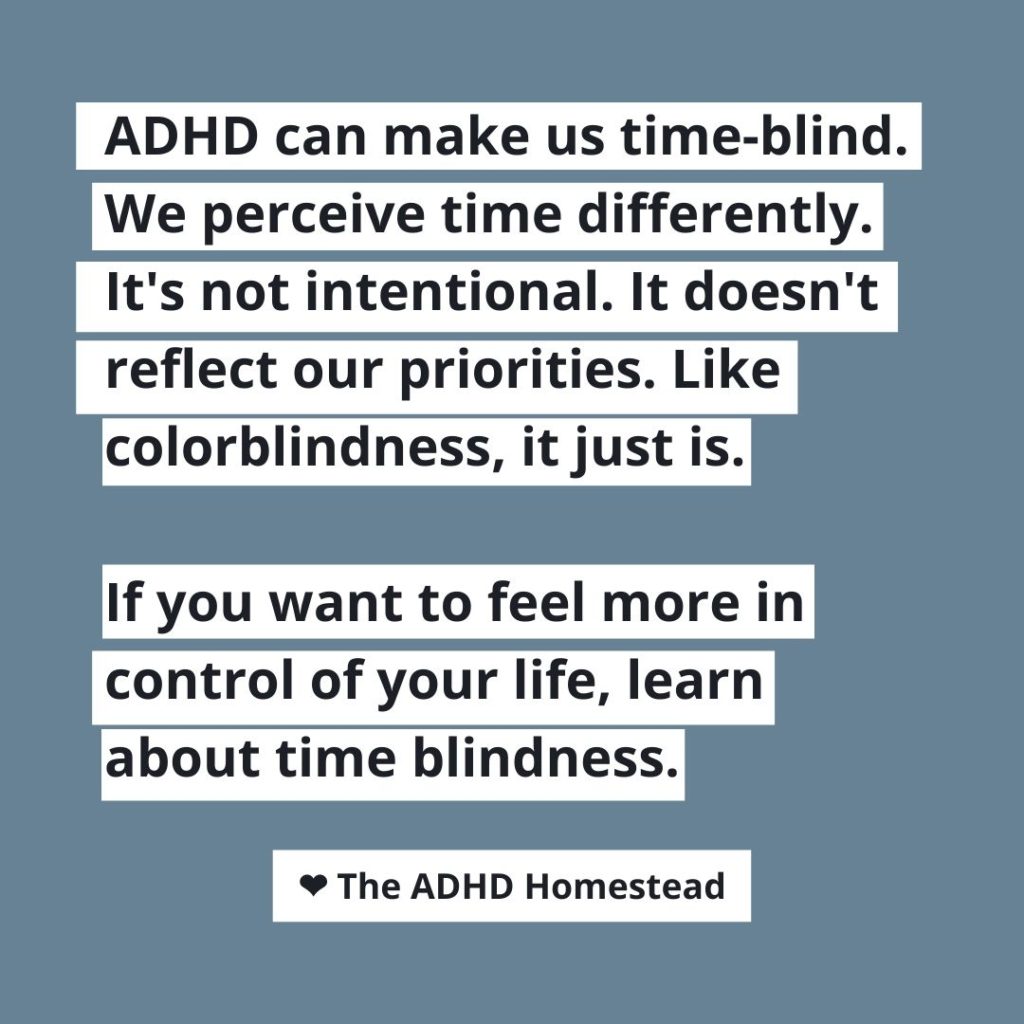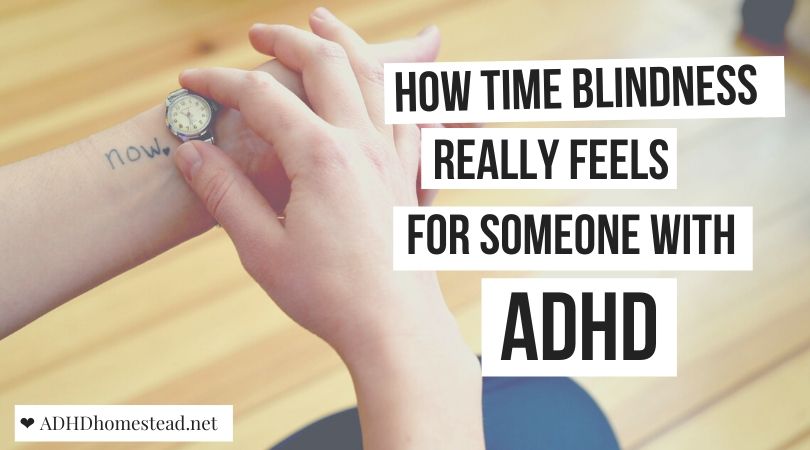Our perception of time — or lack thereof — lays the foundation for our biggest struggles. As Dr. Russell Barkley explains it, ADHD “disrupts the fabric of time.” And while time feels like it should be a simple concept, ADHD’s time-blindness finds some complicated ways to hurt us.
Neurotypical people may wonder, what could be so difficult about looking at your watch? How could you not know how long it takes to get ready for work in the morning? How could you not have realized you didn’t have time to mow the lawn before our date?
ADHD makes these most basic life skills exceptionally difficult. Time-blindness causes all the screw-ups mentioned above, and more. It kills our self-esteem and exacerbates our emotional volatility. It can even put us in danger of seriously harming ourselves.
Time-blindness hurts ADHDers’ relationships with ourselves and others
Time management has deep ties to love and respect. Let’s say I promise to meet you at a restaurant for dinner at 6:00, but I show up a half-hour late. How do you feel, having made excuses to the server and finally ordered a glass of wine alone at a table for two?
Showing up late to dates, meetings, and everything in between sends a message: I valued you less than something else. A person left waiting every time feels they’ll never be as important as literally anything else you could be doing.
But this isn’t true.
For people with ADHD, intentions and actions don’t always line up. We experience an agonizing dissonance between the self we know and the person our actions present to the world.
Our culture starts teaching time management to children in preschool. A five-year-old knows how to stop one activity and move on to another. Imagine the pain an adult with ADHD feels when we fail at a basic life skill. It’s easy to forget these skills are learned, not innate. People with ADHD don’t learn them easily. Someone with undiagnosed/untreated ADHD may not be able to learn them at all. Failure doesn’t mean we’re irresponsible. It means we’re struggling with a problem we lack the tools to fix.
To everyone else, it looks like we don’t care. And that hurts us, too.

If you have ADHD, time-blindness is as intentional as colorblindness
Yes, really. I’ve heard it from strangers and I’ve heard it from my own family: how could X ADHD behavior not reflect intention?
A colorblind person can’t perceive differences between certain hues. They know those differences exist — and other people can see them. A time-blind person may know we should look at a clock more often, or leave work in time to meet a friend for drinks. That knowledge doesn’t help us when we forget the clock, and maybe time itself, exists at all. When we don’t perceive time passing, we also don’t perceive you waiting at a table alone for us. We don’t feel a deadline inching closer.
It’s one thing to know a fact in your brain: this flower garden is full of rich, beautiful shades of red and green. I need to make sure I’m on time for this meeting. It’s quite another to experience it, at a sensory level.
[clickToTweet tweet=”Showing up late to dates, meetings, and everything in between sends a message: I valued you less than something else. For people with #AdultADHD, intentions and actions don’t always line up.” quote=”Showing up late to dates, meetings, and everything in between sends a message: I valued you less than something else. But it’s not true.”]
Time-blindness is dangerous
A faulty perception of time gnaws away at our relationships and self-esteem. It also presents an immediate danger to emotionally volatile ADHDers.
Hyperfocus, the “in the zone” state many praise as a so-called ADHD superpower, is especially disruptive to our sense of time. And it happens with emotions, not just activities.
Our inability to perceive time outside of the present moment fans the flames of emotional hyperfocus. This may seem charming when an ADHDer can only see the excitement or good in the moment. When we’re happy, we’re 100% happy. But what goes up also goes down. A negative event can trigger intense, even frightening emotions. We can lose sight of our worth in relationships, or life in general.
I once showed up for a doctor’s appointment on the wrong day, after having asked my husband to stay home from work to babysit our son. As soon as I got back into my car in the parking garage, my negative self-talk spun out of control. This would be my entire life: making mistakes like this. My family would be better off without me. My presence in the world could only drag others down and do them harm. And so on.
For someone with ADHD, a simple mistake like this can lead to obsessive, inescapable thoughts of self-harm. It takes some brain-wrangling skills to snap out of it. I don’t see these skills taught or discussed often enough. ADHD puts us at a fivefold risk for deliberate self-harm. We can’t afford to ignore the emotional impact of time-blindness.
People with ADHD suffer plenty for our mistakes
If you have ADHD, I bet you’ve been nodding the whole time. Time-blindness is one of my most popular blog topics. Our perception of time contributes to so many painful experiences, and so much misunderstanding.
If you love someone with ADHD, learn about time-blindness. Watch the video embedded earlier in this post. Remind yourself that time blindness isn’t personal. It doesn’t reflect an ADHDer’s values, intentions, or feelings toward you.
This is especially important for parents of young ADHDers. Our children’s identity and self-worth are formed, in part, by the ways we communicate with and label them. I remember being labeled selfish and inconsiderate, especially as a young teen who should’ve known — and done — better. I understand exactly why it happened. But these conflicts also forged a distance between me and my family. I didn’t know how to reach out and talk about my struggles.

We need both sides of the tough-love equation
When it comes to family, the relationship needs to come first. “Tough” is only half of the phrase “tough love.” When ADHDers make a mistake, we already feel bad. Compounding our negative self-talk with blaming, shaming, and insults doesn’t help. Punishing someone who already feels like a failure doesn’t help. It tears down self-esteem and inflicts yet another wound in the relationship.
Time-blindness is a big deal. It has real causes in the brain: we perceive time differently, much like a colorblind person perceives color differently. You wouldn’t assume a colorblind person simply doesn’t care enough about distinguishing red from green. Neither should you assume a person with ADHD doesn’t care enough to manage time properly.
That said, letting ADHDers get away with bad behavior doesn’t help anyone, either. That includes bailing us out and protecting us from the consequences of our mistakes. Colorblindness doesn’t give anyone license to ignore traffic signals. It also doesn’t make it okay to demand someone sit in the passenger seat and call out the color of the signal for every ride. Likewise, we ADHDers aren’t doomed to go through life hurting people and letting them down every day, nor should we put the burden of responsibility for our time blindness on others.
We need to develop our own ways of navigating the world. Find strategies that work with our unique perception of time, rather than working against or ignoring those differences. In this way we can be accountable, show up for ourselves and the people we love, without feeling browbeaten about our supposed lack of caring.
If you want to live a better life with (or adjacent to) ADHD, you need to make that paradigm shift first. Only then can you open yourself up to the information and strategies that lead to real solutions.
Updates:
- New images added January 7, 2020
- Audio narration added April 15, 2020
- Concluding section expanded June 26, 2020
- Improved audio narration added January 4, 2023
Hey there! Are you enjoying The ADHD Homestead?
Here's the thing: I don't like ads. I don't want to sell your attention to an advertising service run by the world's biggest data mining company. I also value my integrity and my readers' trust above all, which means I accept very few sponsorships/partnerships.
So I'm asking for your support directly. For the cost of one cup of coffee, you can help keep this site unbiased and ad-free.
Below you will find two buttons. The first lets you join our crew of Patreon pals and pledge monthly support for my work. Patrons also have access to my Audioblogs podcast. The second takes you to a simple donation page to pledge one-time or recurring support for The ADHD Homestead, no frills, no strings. Do whichever feels best for you!

